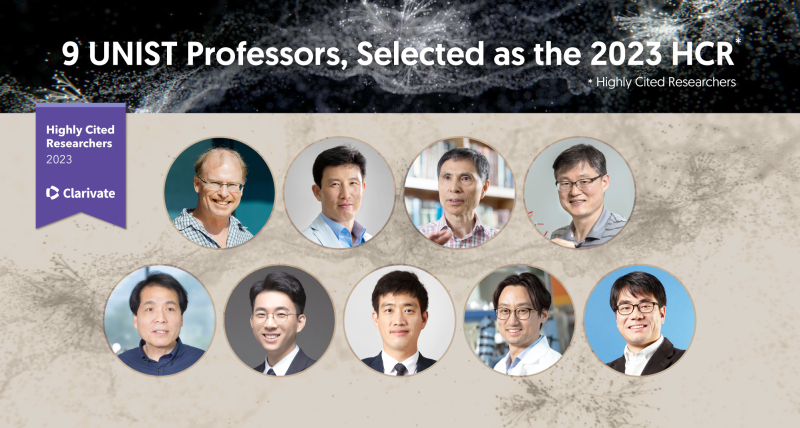
Nine UNIST researchers have once again distinguished themselves with inclusion in the prestigious ‘Highly Cited Researchers (HCR)’ for 2023. This accomplishment places UNIST as the second-highest university in South Korea, following Seoul National University.
On November 15, Clarivate Plc., a global leader in providing trusted information and insights to accelerate the pace of innovation, unveiled the 2023 list of Highly Cited Researchers. The selected researchers have authored papers that rank in the top 1% by citations for their respective fields and publication year worldwide.
This year, a total of 65 researchers from South Korea have been named. Excluding the multiple overlapping fields, a total of 66 researchers in South Korea have been awarded Highly Cited Researcher 2023 designations, with UNIST contributing 9 researchers. Seoul National University secured the highest number of HCRs, followed by UNIST with 9 HCRs and Sungkyunkwan University with 8 HCRs.
The nine distinguished UNIST researchers named as Highly Cited Researchers are as follows: Distinguished Professor Rodney S. Ruoff (Materials Science, 10 Consecutive years), Distinguished Professor Jaephil Cho (Cross-Field, 8 Consecutive years), Distinguished Professor Kwang Soo Kim (Cross-Field, 6 Consecutive years), Distinguished Professor Jong-Beom Baek (Cross-Field, 6 Consecutive years), Distinguished Professor Sang Il Seok (Materials Science, 6 Consecutive years), Distinguished Professor Hyun-Wook Lee (Cross-Field, 5 Consecutive years), Professor Seung Woo Cho (Cross-Field, 3 Consecutive years), Professor Changduk Yang (Cross-Field, 2 Consecutive years), Professor Hu Young Jeong (Cross-Field, 2 Consecutive years).
Distinguished Professor Rodney S. Ruoff and Distinguished Professor Sang Il Seok, who were recognized in the field of materials science, are global leaders in graphene and perovskite solar cells, respectively. Professor Ruoff has been chosen as an HCR for 10 consecutive years since the inception of the list in 2014, while Professor Seok has achieved this honor for 6 consecutive years.
In the Cross-Field category, Distinguished Professor Jaephil Cho, Distinguished Professor Kwang Soo Kim, Distinguished Professor Jong-Beom Baek, Distinguished Professor Hyun-Wook Lee, and Professor Seung Woo Cho were recognized as the world’s most influential minds. The Cross-Field category acknowledges outstanding researchers who have significant influence across various fields, even if their citation count may not be in the top 1% of a single field.
Professor Jaephil Cho, who is known as the world leading expert on secondary batteries, has been included in the HCR list for eight consecutive years. Professor Kwang Soo Kim and Professor Jong-Beom Baek, who have been recognized for six consecutive years, contribute to diverse fields such as chemistry and materials science. Professor Hyun-Wook Lee, who is a leading expert in the area of in-situ transmission electron microscopy (TEM) for secondary batteries, has also been included in the HCR list for five consecutive years. Professor Seung Woo Cho, an expert in biotechnology including gene editing, has been selected as an HCR for three consecutive years.
Professor Changduk Yang and Professor Hu Young Jeong have also been recognized in the Cross-Field category for the second consecutive year. Professor Yang is an expert in next-generation solar cells, particularly perovskite solar cells (PSCs), while Professor Jeong has made outstanding contributions to materials science as a transmission electron microscopy (TEM) researcher.
“Research-oriented universities and their scholars have been responsible for groundbreaking technologies that have revolutionized the world, such as Artificial Intelligence (AI) and the Internet of Things (IoT),” stated President Yong Hoon Lee of UNIST. “UNIST is committed to providing a supportive environment that enables researchers to focus on leading-edge research, fulfilling our mission as a research-oriented university.”
Meanwhile, the 2023 list is based on the number of citations per paper published over an 11-year period from January 2012 to December 2022. Overall, the ranking includes 6,849 individual researchers from more than 1,300 institutions in 67 countries and regions.
The ranking revealed that the United States boasts the highest number of HCRs, with 2,669 researchers on the list, following Mainland China (1,275). Behind them are the United Kingdom (574), Germany (336), and Australia (321). Chinese Academy of Sciences from China Mainland, in particular, produced 270 researchers, making it the world’s largest producer of HCRs. Harvard University (237) comes in second overall, followed by Stanford University (126), and the National Institutes of Health (105).